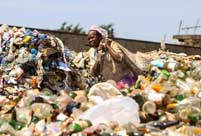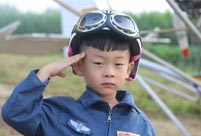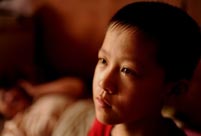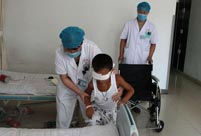Premier Li Keqiang expressed concern on Monday over a looming war in Syria, saying the global economic recovery could be negatively affected.
"A regional conflict could make the economic recovery more difficult," Li said while meeting Klaus Schwab, executive chairman of the World Economic Forum.
Li said the principle of the UN Charter must be adhered to so that a political solution can be achieved. China is willing to work with the international community to build a peaceful and stable environment for the world economy to recover.
Li met Schwab in Dalian two days before the opening of the annual World Economic Forum's "Summer Davos".
The premier also expressed his confidence in the economic strength of emerging economies, which have been hit hard by capital outflows in anticipation of the tapering off of ultra-loose monetary policy in the United States.
"Thanks to the more flexible exchange rate regimes and larger foreign exchange reserves, China is confident that the emerging economies are better placed to cope with the challenges than they used to be," Li told Schwab.
Also on Monday, Li wrote in a Financial Times opinion piece that he believes Asian economies will not see a repeat of the 1997 financial crisis.
"In my view, the Asian countries have learnt lessons from their experiences and have significantly enhanced their capabilities to fend off risks," Li wrote.
On China's economy, he said he sees sustainable and healthy growth, while promising to continue reform and opening-up. "Some observers ask whether China's economic slowdown will lead to a sharp decline, or even a hard landing, and whether our reform program will be derailed by complex social problems. My answer is that our economy will maintain its sustainable and healthy growth and China will stay on the path of reform and opening up.
"We will continue to streamline government and delegate power, press ahead with structural changes and grow economic sectors under diverse ownership," he wrote.
"Government will leave to the market and society what they can do well while concentrating on those matters within its purview."
He promised to advance reforms on administrative management, fiscal and tax systems, financial sectors and pricing.
Tang Jianwei, an economist at Bank of Communications, said Li's remarks reflect the premier's confidence in China's economy and his resolve to push forward with reform.
"The centerpiece of Li's reform is to define the boundary between market and government. Government will withdraw from where it should not be and leave the space for the market and society," Tang said.
He said he disagreed with what the market describes as "Likonomics", saying Li's governing philosophy should not be summarized by short-term policies, such as de-leveraging and refraining from large-scale stimulus.
Guan Qingyou, a senior leader at the Minsheng Securities Research Institute, said rather than de-leveraging, a main theme of Li's policies is de-regulation, evident in his consistent call for the introduction of private capital to reinvigorate the market.
Ding Zhijie, dean of the School of Banking and Finance at the University of International Business and Economics, said China should refresh its thinking on opening-up in the next phase and gradually open its capital account to allow individuals, rather than the government, to hold the nation's foreign exchange reserves.
The opening-up of China's capital account will allow households and enterprises to invest abroad and boost returns on the foreign exchange reserves, he said.
 Mountain of garbage in Nairobi
Mountain of garbage in Nairobi Highlights of MAKS 2013 Int'l Aviation and Space Show
Highlights of MAKS 2013 Int'l Aviation and Space Show  10th China-ASEAN Expo opens in Nanning
10th China-ASEAN Expo opens in Nanning Eagle Boy takes to sky to break another record
Eagle Boy takes to sky to break another record 12-year-old boy becomes pillar of the family
12-year-old boy becomes pillar of the family Eye-gouged boy receives blind rehabilitation in Shanxi
Eye-gouged boy receives blind rehabilitation in Shanxi Top 10 naked hotels in the world
Top 10 naked hotels in the world The most gorgeous Chinese women in the eyes of foreigners
The most gorgeous Chinese women in the eyes of foreigners A collection of bizarre rooftop buildings around China
A collection of bizarre rooftop buildings around China Putin intimate contacts with marine animals
Putin intimate contacts with marine animals China's frigate 'Bengbu'in fire training
China's frigate 'Bengbu'in fire training Fresh students 'forced' to register in university independently
Fresh students 'forced' to register in university independently 2013 Taiwan Int'l Tourism Expo kicks off in Taipei
2013 Taiwan Int'l Tourism Expo kicks off in Taipei Photo story: Take a gap year
Photo story: Take a gap year Nokia's Global Headquarters: visiting a declining empire
Nokia's Global Headquarters: visiting a declining empireDay|Week|Month